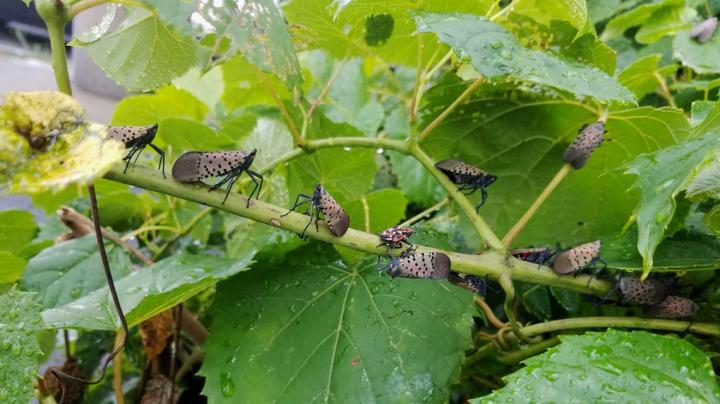
Credit: Eric H. Clifton, Cornell University
ITHACA, N.Y. – Cornell University-led research reports that two local fungal pathogens could potentially curb an invasive insect that has New York vineyard owners on edge.
The spotted lanternfly feeds on more than 70 plant species, including grape vines and apple trees.
Now, the paper, “A pair of native fungal pathogens drives decline of a new invasive herbivore,” led by Eric Clifton, a postdoctoral researcher in the lab of Cornell professor of entomology and co-author Ann Hajek, describes how two unrelated fungi – Batkoa major and Beauveria bassiana – have been decimating spotted lanternfly populations near Reading, Pennsylvania.
“The finding is important because these naturally-occurring pathogens could be used to develop methods for more environmentally-friendly control of this damaging invader,” Hajek said.
“It’s a great example of how a major new invasive herbivore can be suppressed by native pathogens,” Clifton said. “Nobody stepped in to do this; it all happened naturally.”
Native to China, Taiwan and Vietnam, the spotted lanternfly was first discovered in southeastern Pennsylvania in 2014 and has spread to seven more states. Adult insects occasionally have been sighted in New York, but there are no signs yet of large populations. Entomologists and growers believe it’s just a matter of time before spotted lanternflies settle in New York, which boasts a nearly $5 billion grape, grape juice and wine industry, and also stands as the country’s second-largest apple producing state. In Pennsylvania, spotted lanternflies damaged at least a half-dozen vineyards from 2017 to 2018. While there are no reports of spotted lanternflies infecting apple orchards in the U.S., the insects have damaged apples in Korea.
In late 2017 Clifton and Hajek began responding to reports of fungi killing the insects in Berks County, Pennsylvania. In early October 2018, they investigated a site near an apple orchard. “It was clear anywhere you walked, you’d see dozens of lanternflies killed by Beauveria on the ground, and then you’d see cadavers all over the trees killed by Batkoa,” Clifton said.
Back at the lab, the researchers used genetic techniques to identify the two fungi. They found that 97 percent of lanternflies on tree trunks were killed by B. major, while on the ground 51 percent of cadavers were killed by B. bassiana and the rest by B. major.
“If you like apples, if you like grapes and wine, if you like beer (which requires hops, another plant eaten by spotted lanternflies), spotted lanternflies can attack those, and that has growers worried,” Clifton said.
###
Louela Castrillo, an entomologist at the United States Department of Agriculture (USDA) Agricultural Research Service on Cornell’s campus, and Andrii Gryganskyi, a molecular biologist at L.F. Lambert Spawn Co., are co-authors of the study.
The study was funded by the USDA.
Cornell University has dedicated television and audio studios available for media interviews supporting full HD, ISDN and web-based platforms.
Media Contact
Lindsey Hadlock
[email protected]
Original Source
http://news.
Related Journal Article
http://dx.




